Discussing the influences and antecedents of Red Dwarf can be tricky. Do we look at the show in terms of its science fiction, or as a sitcom?
In terms of science fiction, albeit comic science fiction, Dark Star is the big one. The idea of having normal people rather than heroes, and in particular its portrayal of working class people in space, seems to have originated here for Grant Naylor. Alien also feeds into this, along with influencing many sets in the show, not to mention all the shenanigans in “Polymorph”. Holly clearly has his roots in HAL from 2001: A Space Odyssey1, and so does the first opening theme tune.
As for pure sitcom, there’s the classic “Steptoe and Son in space”, which is often thrown around as an early concept for the show. Porridge is also endlessly mentioned, in terms of the claustrophobic situation between characters which the show was trying to evoke. All of this is certainly true, but with the odd honourable exception, there’s typically very little analysis beyond mentioning a TV show or film, along with a one line description.
And then there’s Hancock’s Half Hour. A show which doesn’t immediately spring to mind when talking about Red Dwarf. Yet the episode “The Tycoon” (TX: 13/11/59) has a number of remarkable similarities to the Red Dwarf episode “Better Than Life” (TX: 13/9/88), broadcast nearly thirty years later. Moreover, I don’t just mean in terms of character work – the main plot beats of the episode are broadly identical, despite “Better Than Life” seemingly hanging off a science fiction idea which Hancock would find impossible to replicate.
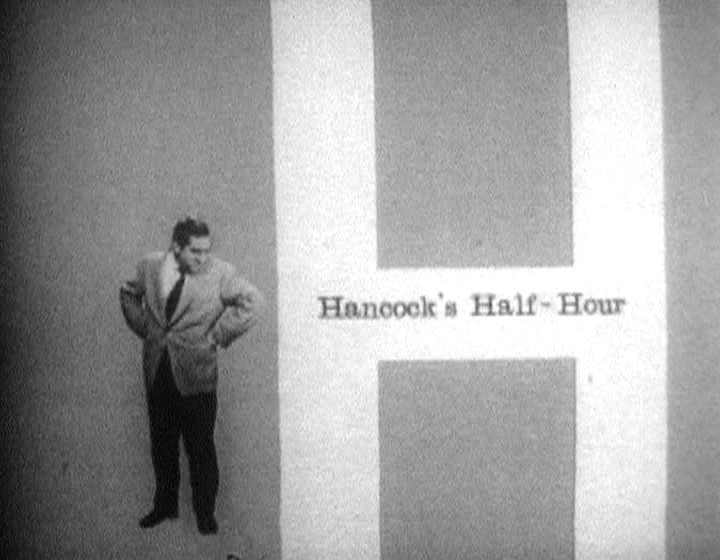
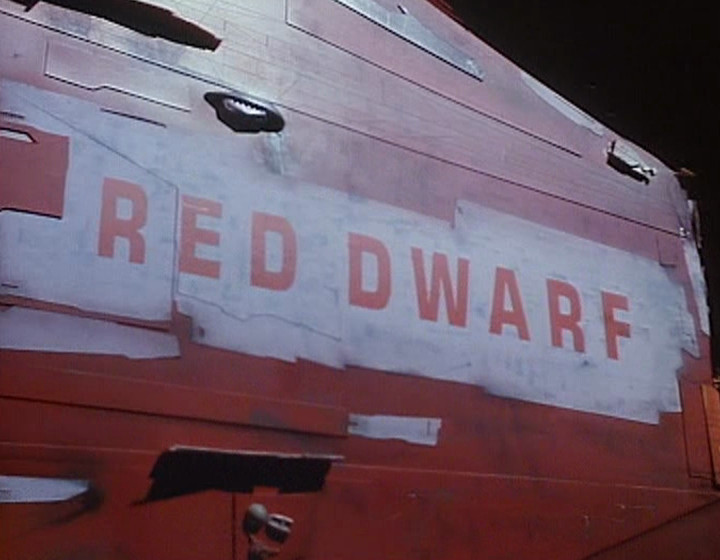
Rather than vague hand-waving or simplistic single line reductions, let’s take a look at both episodes in detail, shall we?
Act 1: The Misery
I won’t keep you waiting for the hook too long. Both “The Tycoon” and “Better Than Life” involve a character escaping into a fantasy world. And if you’re going to have a show where your character escapes into a fantasy world, it’s worth giving them a pretty good reason to want to escape the real one. With Hancock, we start with our eponymous hero perusing the morning papers and reading the stocks section… and very quickly deciding to try and leap out of the window:
HANCOCK: Let me go. I’m ruined. This is the only way. Let me put an end to it all. It’s 1929 all over again. Let me go Sid, I’m finished. I can’t face the world any more. Let me go. I can’t face the future a broken, ruined man. It’s better it should end this way. Let me go.
JAMES: Shut up a minute. Have you gone raving mad?
HANCOCK: Don’t you understand? I’m ruined. I’m boracic lint, I’m skint. The market has collapsed. Let me do the decent thing.
JAMES: Now, don’t do anything that you may regret later.
HANCOCK: There isn’t gonna be any later, you fool. I’m gonna jump out the window.
Red Dwarf delivers the financial bad news not with a morning paper, but with a letter:
LISTER: Smeg! Outland Revenue.
RIMMER: Oh oh oh oh, Outland Revenue!
LISTER: Eight thousand five hundred!
RIMMER: Eight thousand five hundred? That’s a lot of tax isn’t it, Lister? How on Titan are you going to pay for that, eh?
LISTER: I’m not. It’s yours.
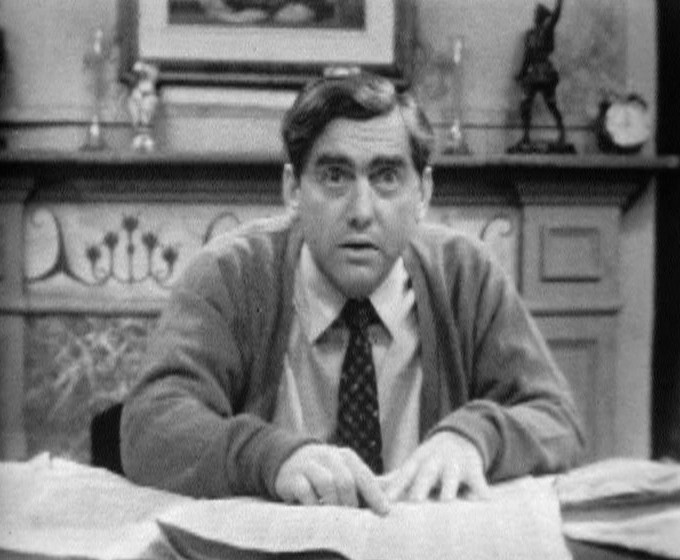
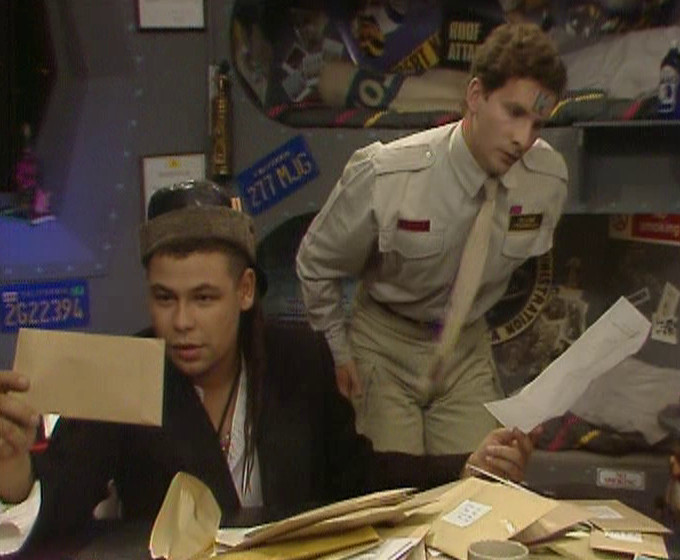
Admittedly, with Red Dwarf, the revelation of the real bad news ups the stakes somewhat, which is an interesting decision in itself, and perhaps not what you would expect when comparing the two shows:
LISTER: This handwriting’s terrible. “I hope this epistle finds you adequately healthy to discharge your duties.” You know maybe I shouldn’t be reading this deeply personal stuff.
RIMMER: Just get on with it.
LISTER: “I write to…” I can’t read that. Oh, “I write to inform. I write to inform you that your father is dad.” Well of course he is. Maybe it’s your father stroke dad…
RIMMER: It’s dead.
LISTER: I can’t make it out.
RIMMER: My father is dead.
LISTER: What?
RIMMER: My father is dead!
LISTER: Oh yeah it’s an E. That’s what it is. [Happily] Your father’s dead, Rimmer!
In both episodes, the character’s best friend (who nonetheless share rather an antagonistic relationship) tries to talk them out of their troubles, although Sid is rather tougher than Lister:
JAMES: Alright then. Go on, jump. Well, go on. Have a go.
HANCOCK: All right then, I will.
JAMES: Go on then, I’m waiting.
HANCOCK: All right, I’m going. There’s no need for you to worry.
JAMES: I’m not worried boy, go on.
HANCOCK: Yes, well, I intend to. You won’t stop me.
JAMES: I don’t wanna stop you. Go on.
HANCOCK: Well there we are. That’s all right, isn’t it?
JAMES: Yeah.
HANCOCK: Right, at least I know where I stand.A pause.
JAMES: Want a push?
Although even Sid gets fed up after a while:
JAMES: Oh, come in and put the kettle on.
HANCOCK: All right. By heavens Sid, it was a good thing you were there.
Lister’s effort at cheering up Rimmer, meanwhile, is rather more poignant:
LISTER: I remember when my dad died you know. I was only six. I got loads of presents off everyone like it was Christmas. I remember wishing a couple more people would die so I could complete my Lego set. My grandma tried to explain, you know. She said he’d gone away and he wasn’t coming back. So, I wanted to know where, like, you know. She said he was very happy and he’d gone to the same place as my goldfish. So I thought they’d flushed him down the bog. I thought he was just round the U-bend, you know? I used to stuff food down, you know, and magazines and that for him to read. They took me to a child psychologist in the end because they found me with my head down the bowl reading him the football results.
RIMMER: I knew he was dead. I mean they’re all dead, aren’t they?
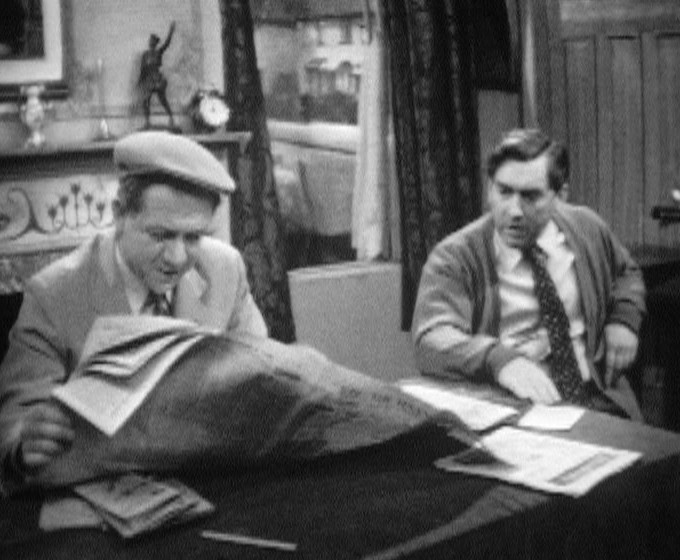
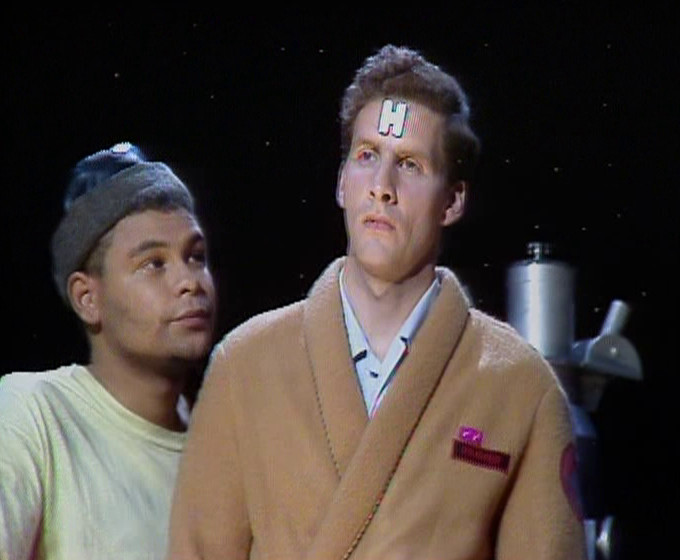
And both characters are given something to take their mind off their troubles by their best friend… from the same source that caused the trouble in the first place. Sid, with the same newspaper that gave the stocks news:
JAMES: [reads newspaper] “The East Cheam Building Society. Extraordinary general meeting of all shareholders is called for Monday at 2 o’clock.” That’s today. “It is extremely important that all shareholders attend this meeting to discuss the future of this society.”
HANCOCK: Well?
JAMES: Well, you got shares in it, haven’t you?
HANCOCK: Have I?
JAMES: Yes, in that job lot I sold you last week.
Meanwhile, Lister, who gets the Total Immersion Videogame from the same post pod as the letter:
LISTER: Rimmer, listen – me and the Cat were going to play a TIV. We wondered if you wanted to come?
Hancock goes to visit the East Cheam Building Society EGM in order to take part, but dozes off and starts dreaming. Meanwhile, the Dwarfers get hooked into the TIV – an artificial reality game.
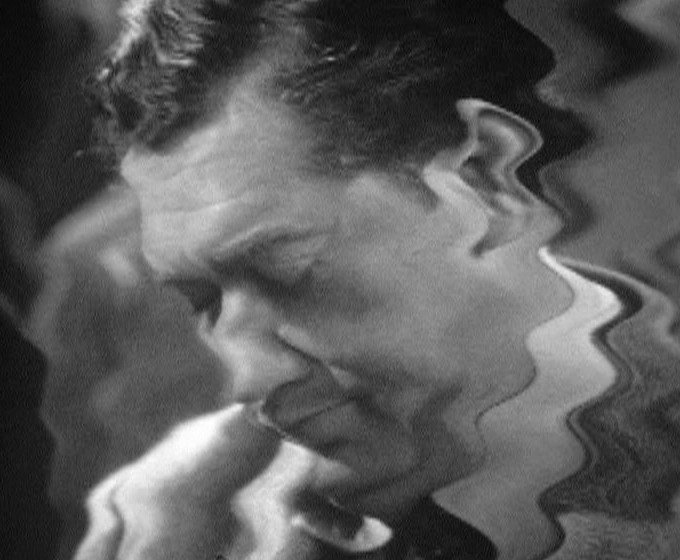
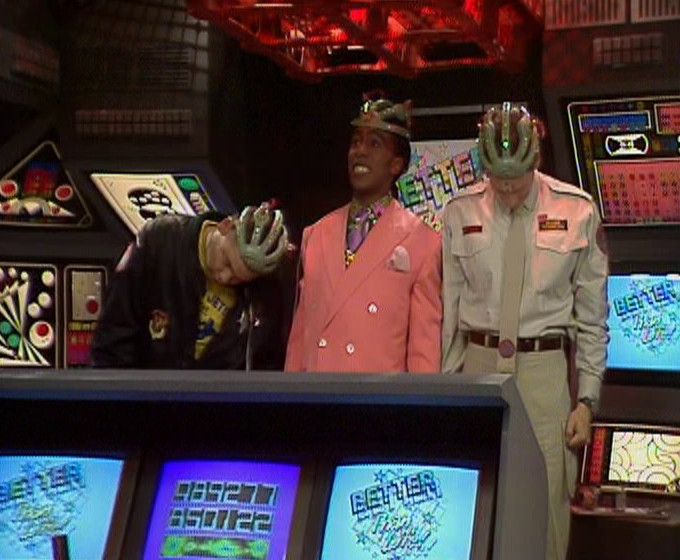
Both are entering their fantasy worlds, and from this point all but the final scene of each episode is not reality…
Act 2: The Fantasy
As we enter Hancock’s dream, we find him still sitting in the East Cheam Building Society EGM, but things are now rather different. Hancock’s fantasy is all about power:
CHAIRMAN: This company is facing disaster. There is nothing I or my fellow directors can do to stop this trend. I have no alternative but to ask you to accept my resignation. I suggest you place the future of this company in the hands of the only possible man who can save it. I refer, of course, to the greatest financial wizard the economic world has ever known: Anthony Hancock.
Rimmer’s fantasy, meanwhile, is all about, erm, power:
CADET: Sir, I know it’s a most awful bore, but would you mind just signing this.
He produces a book and pen.
RIMMER: What’s that, you little pipsqueak?
We now see that the book has a colour photo of Rimmer on the front in full uniform.
RIMMER: [Reading the cover] “My Incredible Career, by Admiral A. J. Rimmer.”
CADET: I’ve read it eighteen times, sir.
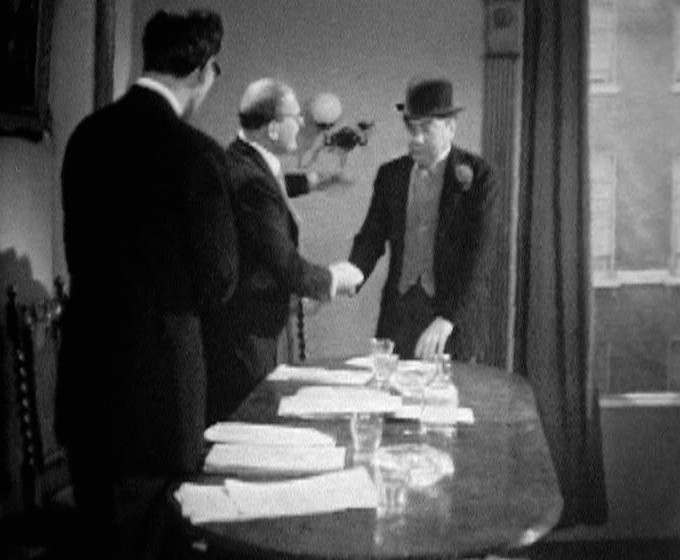
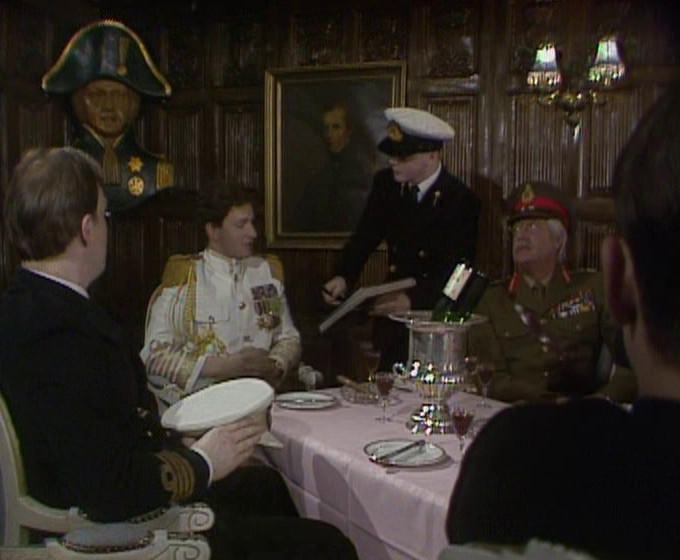
With Hancock, we get an extended sequence of the lad ‘imself getting stinking rich. World conquest is within his grasp. However, even in his own fantasy his brain rebels, and he gets into a rather nasty card game with his rival Aristotle Thermopylae. Whoever wins the game owns all of the world’s wealth. Unfortunately:
HANCOCK: There you are. I’ve beaten you, I’ve ruined you. You haven’t got a single trick.
THERMOPYLAE: But neither have you, my friend. It is you who are ruined.
HANCOCK: How can be both be ruined?They both slowly look at James, who is tidying up the cards. He smiles.
JAMES: My pot, I believe, gentlemen?
Rimmer’s diseased brain, meanwhile, gives him financial troubles of his own…
TAXMAN: Mister Rimmer?
RIMMER: Yes?
TAXMAN: Mister Arnold Judas Rimmer?
RIMMER: Yes?
TAXMAN: Outland Revenue, sir.
RIMMER: Oh my God!
TAXMAN: This is a demand for immediate payment.
RIMMER: Eighteen thousand?
TAXMAN: If you are unable to pay, sir, I am instructed by the Revenue to break both your legs and pull off your thumbs… sir.
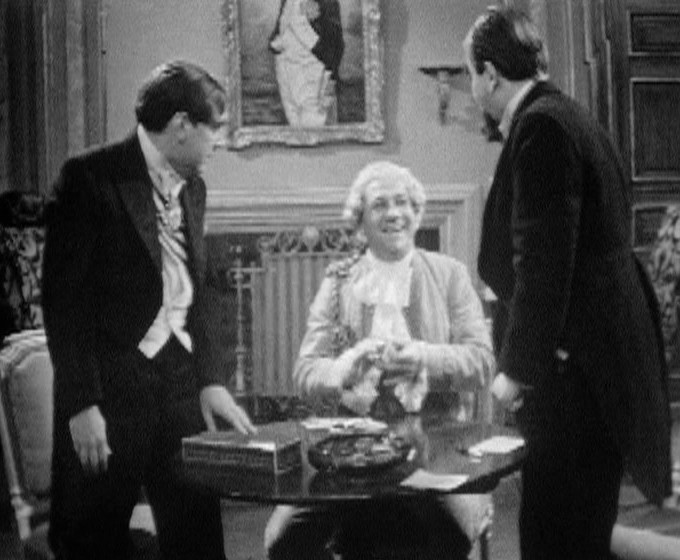
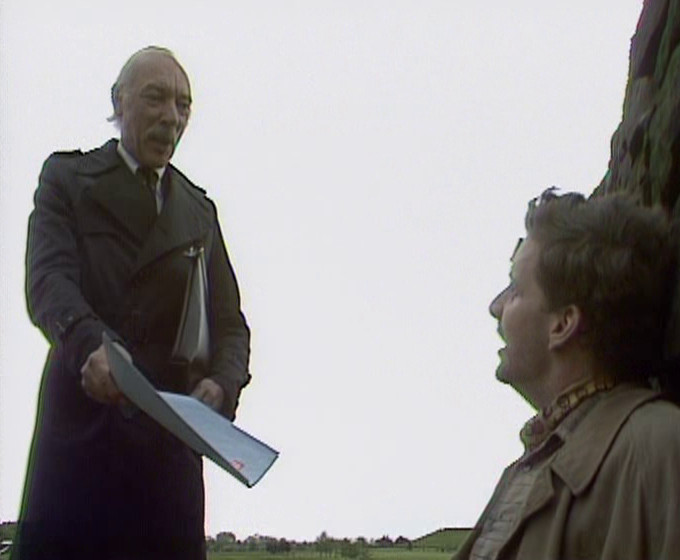
And so both Hancock and Rimmer have lost everything. As Hancock awakes from his dream, and the Dwarfers exit the TIV…
Act 3: The Reality
…both programmes end on a callback joke about the character’s financial situation, and possible physical unpleasantness:
CHAIRMAN: What’s going on here? What’s happening?
JAMES: He suddenly attacked me.
HANCOCK: I had every right to. I owned half the world till he came along, half the world. Him and his Chinaman’s whist. Let me get at him.
INVESTOR: Send for an ambulance, somebody.
HANCOCK: He’s ruined me. Ruined me, I tell you.
INVESTOR: He’s mad.
HANCOCK: I’m not mad. Ask Aristotle Thermopylae. He ruined him as well.
JAMES: Wait a minute, Hancock. You’ve been dreaming, boy.
HANCOCK: Leave me alone, let me go. Ruined! Ruined!He races to the window.
HANCOCK: Farewell!
And jumps… only to find out he’s on the ground floor.
HANCOCK: Oh for crying out loud, don’t they build anything above ground level?
Poor old Rimmer, meanwhile…
LISTER: Who said you was a loser, eh? Who said nice things never happen to you?
The door to the cupboard opens, and the taxman comes out carrying a big hammer.
TAXMAN: I did!
LISTER: Oh no, we’re still in the game!
TAXMAN: You certainly are. Now, what about my eighteen grand? Come on, it’s bone crunching time, me old china. Now, where’s those little thumbies?CRUNCH.
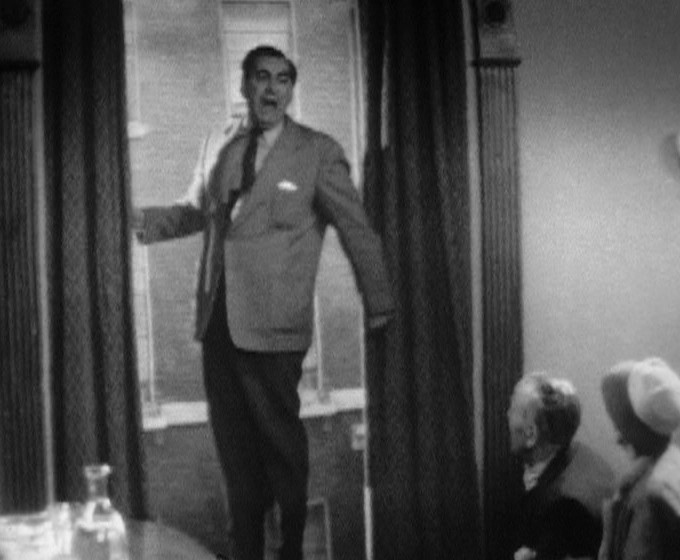
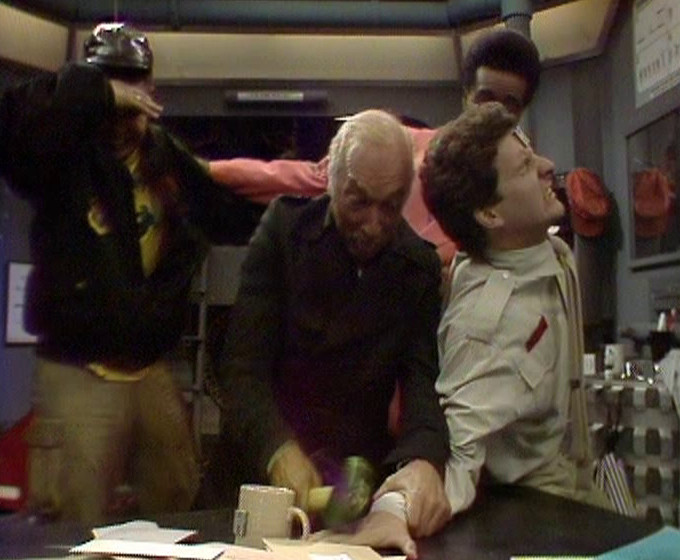
And as each show ends, it’s worth taking a moment to ponder what we’ve just seen. With an episode like Red Dwarf‘s “Better Than Life”, it’s always tempting to look back on science fiction antecedents. What was the first story to feature an artificial reality game? How did that story progress? All of which is well worth analysing, of course.
But the broad points of the Hancock episode here are, to all intents and purposes identical to Dwarf‘s, despite the fact that there is no science fiction involved whatsoever. Substitute an artificial reality game for a dream, and you remove the science fiction element from the story entirely, yet the major story beats match nearly exactly. A character has something awful happen to them, escapes into a fantasy world… but crucially, their own inner character screws everything up for them, because they won’t let themselves be happy. That is the story, not the artificial reality shenanigans.
HANCOCK: Even in me dreams, he’s still at it!
RIMMER: My brain’s rebelled. It just won’t accept nice things happening to me. It just keeps fantasising horribleness.
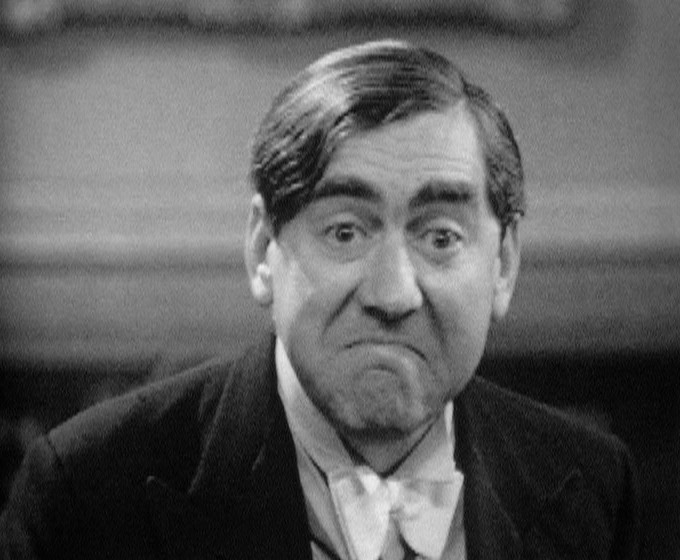
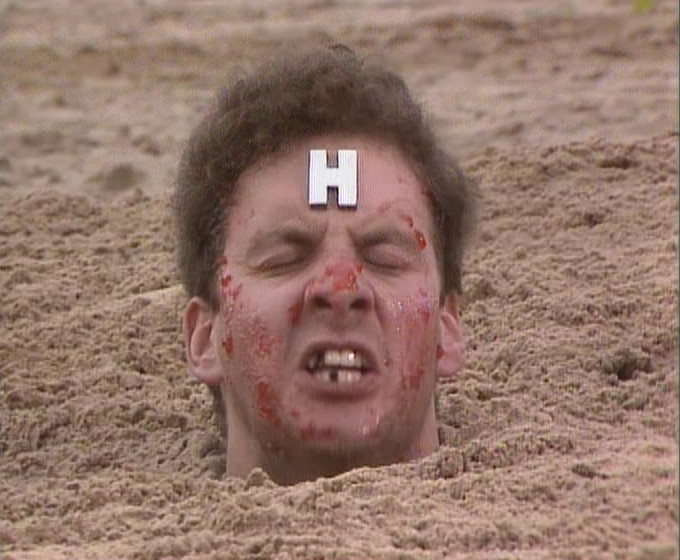
All of which explains why, whenever I look at Red Dwarf, I still see a character comedy first, and science fiction second. Although trust Hancock to have done everything thirty years before. Not content with inventing the modern audience sitcom, it has the cheek to do Red Dwarf‘s supposedly science fiction ideas first too.
Stone me.
A version of this post was first published on Ganymede & Titan in August 2016.
A fact made more obvious by looking at Red Dwarf‘s precursor “Dave Hollins: Space Cadet” in Radio 4’s Son of Cliché, featuring… Hab. ↩

One comment
Ant on 30 July 2022 @ 1pm
Christ this is good stuff.
Comments on this post are now closed.